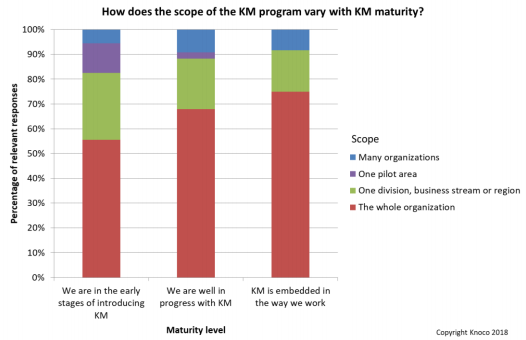Budget and time in knowledge management
Learn More
Knowledge management, like many organizational changes, requires adequate budgeting. Many knowledge management activities, such as training and hiring a teacher, purchasing new software and its infrastructure, hiring people to develop knowledge management strategies and processes, etc., have costs for the organization. However, it should be noted that this is not just a cost but an investment, with millions of dollars in return on investment.
Now the question arises, how much should it cost to do this? To estimate the cost, it is necessary to calculate the minimum budget condition and the highest possible budget condition by considering the required measures and resources. However, it should be noted that the initial budget is not entirely accurate and can change along the way for the project for reasons such as travel grants, changes in technology and support costs, consulting services, etc. Your initial estimate will change over time, and the best solution is to create a budget plan with a three-year time horizon and a more accurate budget plan for the next year.
• In the process section, costs to facilitate processes, document them, etc .;
• In the technology sector, costs for analyzing user needs, updating technologies, maintenance costs of technologies, etc .;
• In the leadership department, expenses for monitoring, reporting, creating guides and instructions, etc .;
• In the responsibilities and responsibilities, it costs to define new roles such as knowledge manager, scientist, etc.
In most cases, we see that organizations pay more attention to technology than any other factor, which weakens the foundations of knowledge management; Because technology alone does not meet the needs of knowledge management.
Proper patterning to determine the budget Once you have a budget plan, you can use some of the available templates to measure and benchmark, the first of which is the Global Knowledge Management Survey. Knoco conducted this survey from 2014 to 2017. Part of the survey asked participants to specify their annual budget. Of the 118 participants, about 20 percent were unaware of the budget, and 51 did not share their budget. The results of this survey can be seen in the chart below.
 • Organizations that have evaluated themselves in the early stages of knowledge management have had an average of 3.5 years of knowledge management in their programs.
• Organizations that have evaluated themselves in the early stages of knowledge management have had an average of 3.5 years of knowledge management in their programs.
• Organizations that have progressed with knowledge management have had an average of 2.8 years of knowledge management in their programs.
• Organizations whose knowledge management practices are well established have had knowledge management on their agenda for an average of 11.8 years.
Therefore, according to the above results, it can be said that the establishment of knowledge management takes a long time. Of course, this does not mean that it takes 8 to 12 years to return on investment. This means that knowledge management takes a long time to stabilize and establish itself in the organization.
Now the question arises, how much should it cost to do this? To estimate the cost, it is necessary to calculate the minimum budget condition and the highest possible budget condition by considering the required measures and resources. However, it should be noted that the initial budget is not entirely accurate and can change along the way for the project for reasons such as travel grants, changes in technology and support costs, consulting services, etc. Your initial estimate will change over time, and the best solution is to create a budget plan with a three-year time horizon and a more accurate budget plan for the next year.

What should the budget allocation be like, and what parameters should it include?
There is no clear and precise formula for allocating a knowledge management budget, but it should be noted that a significant portion of the budget is allocated to the four areas of the process, technology, leadership, and plans and responsibilities.• In the process section, costs to facilitate processes, document them, etc .;
• In the technology sector, costs for analyzing user needs, updating technologies, maintenance costs of technologies, etc .;
• In the leadership department, expenses for monitoring, reporting, creating guides and instructions, etc .;
• In the responsibilities and responsibilities, it costs to define new roles such as knowledge manager, scientist, etc.
In most cases, we see that organizations pay more attention to technology than any other factor, which weakens the foundations of knowledge management; Because technology alone does not meet the needs of knowledge management.
Proper patterning to determine the budget Once you have a budget plan, you can use some of the available templates to measure and benchmark, the first of which is the Global Knowledge Management Survey. Knoco conducted this survey from 2014 to 2017. Part of the survey asked participants to specify their annual budget. Of the 118 participants, about 20 percent were unaware of the budget, and 51 did not share their budget. The results of this survey can be seen in the chart below.

The amount of time required to implement knowledge management
Another factor influencing the knowledge management budget is its implementation time. You can also refer to the Knoco survey results to measure the time required for knowledge management. Participants in the survey described the maturity of knowledge management in organizations in two ways: first, by estimating the number of years they have implemented knowledge management, and second, by measuring the organization's level of maturity (initial or full maturity). The chart below shows the percentage of participants in terms of their assessment and responses.
• Organizations that have progressed with knowledge management have had an average of 2.8 years of knowledge management in their programs.
• Organizations whose knowledge management practices are well established have had knowledge management on their agenda for an average of 11.8 years.
Therefore, according to the above results, it can be said that the establishment of knowledge management takes a long time. Of course, this does not mean that it takes 8 to 12 years to return on investment. This means that knowledge management takes a long time to stabilize and establish itself in the organization.

















